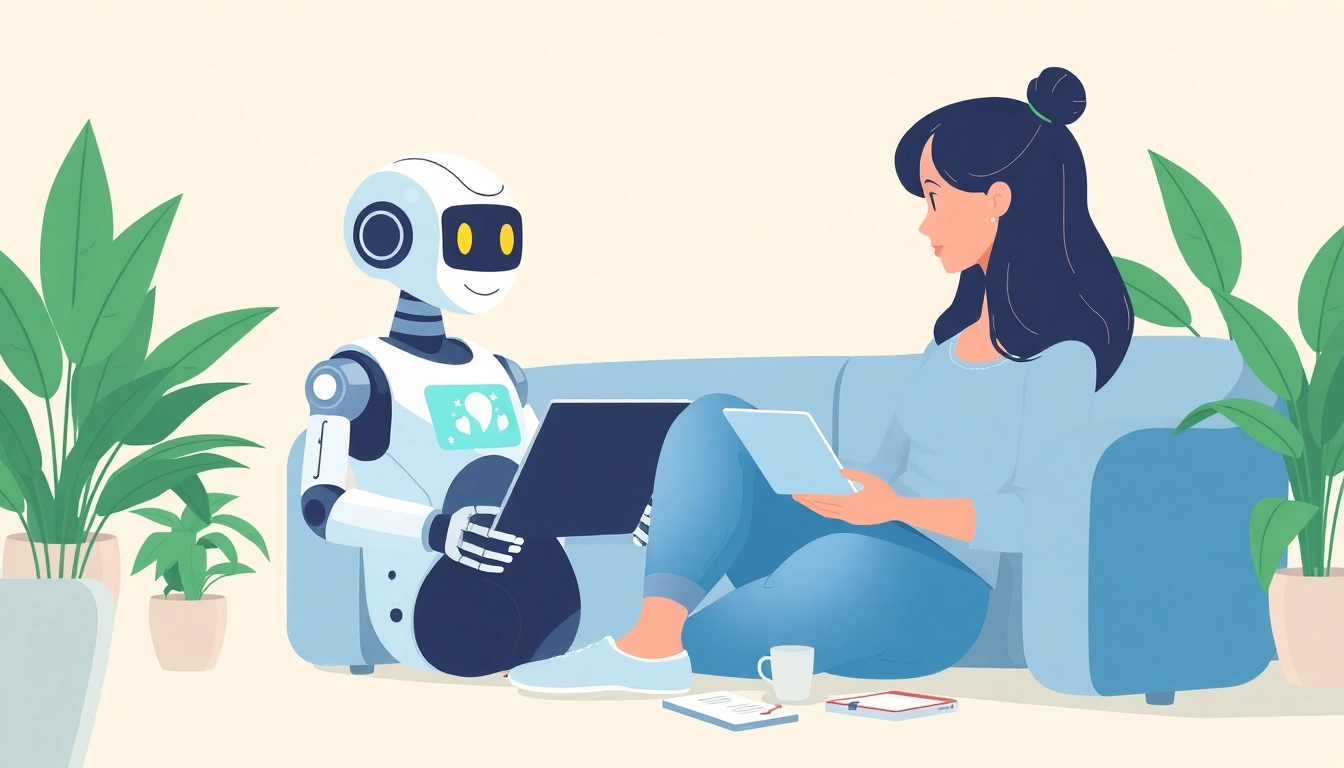What is an AI Therapist?
Definition and Core Features
An AI Therapist refers to computer-based applications or programs designed to simulate therapeutic conversations and provide mental health support. These digital tools utilize artificial intelligence technology to engage users in meaningful discussions, offering coping strategies, emotional support, and psychoeducational resources. Users can interact with AI therapists through various modalities such as chatbots, mobile applications, or virtual reality environments.
The core features of AI therapists generally include 24/7 accessibility, anonymity, personalized content delivery, and regular mood tracking. Facilitating conversations in a supportive, judgment-free environment, AI therapists aim to make mental health support accessible to everyone, particularly those who may feel uncomfortable seeking help from human therapists.
How AI Therapists Function
AI therapists operate based on algorithms that incorporate conversation design principles and natural language processing capabilities. These models analyze user input, identify emotional cues, and respond in ways that are meant to provide reassurance, reflection, or guidance. While some AI therapists use predefined scripts, advanced systems are capable of learning from interactions, adapting their responses over time to become more effective in addressing individual user needs.
Most AI therapists are grounded in cognitive-behavioral therapy (CBT) principles, which focus on identifying and changing negative thought patterns. Users engage in activities ranging from problem-solving exercises to mood journaling, thereby encouraging active participation in their mental health journey.
Comparative Analysis with Human Therapists
While AI therapists offer many advantages, it is crucial to understand how they stack up against traditional human therapists. For one, AI therapists can provide round-the-clock support without scheduling constraints, making them a valuable resource for people needing immediate help. They also often come at a significantly reduced cost—or are available for free—lowering the barriers to access.
However, human therapists possess empathetic understanding and a nuanced comprehension of complex emotional states that AI currently lacks. The interactive aspect of therapy, which builds crucial therapeutic alliances, cannot be fully replicated by machines. This comparison highlights that AI therapists can complement traditional methods but may not replace the depth of understanding that human interaction provides.
The Benefits of Using AI Therapists
Accessibility and Availability
One of the most significant benefits of AI therapists is their unparalleled accessibility. Mental health care can often be challenging for individuals due to waiting times, funding issues, or geographical barriers. AI therapists break these barriers by providing immediate support at any time of day, making it easier for users to engage in therapy when they are ready.
Moreover, AI platforms often operate without geographic limitations, allowing users in remote areas to access mental health resources that would typically be unavailable to them. This democratization of mental health care helps reduce stigma and normalizes discussions about emotional well-being.
Personalization in Therapy
AI therapists leverage data analytics and machine learning to personalize the therapeutic experience. By collecting data on user interactions and preferences, these systems can tailor responses and recommendations to suit the unique needs of each individual. For example, if a user frequently discusses anxiety-related topics, an AI therapist may prioritize resources and strategies aimed specifically at tackling anxiety.
This level of personalization enhances user engagement and ensures that therapy feels relevant and supportive, making it more likely for users to stick with their therapeutic process and experience positive outcomes.
Cost-Effectiveness of AI Therapy
Another notable advantage of AI therapists is their cost-effectiveness. Many AI platforms offer free services, while others charge significantly lower fees compared to in-person therapy sessions. This financial accessibility allows individuals from various socioeconomic backgrounds to seek help for their mental health issues without incurring the burden of large bills.
For some users, AI therapy can serve as an effective supplement to traditional therapy, providing tools and support between in-person sessions. Additionally, achieving effective mental wellness support at a lower cost reduces overall healthcare expenditures for society, making AI therapists an appealing proposition.
Challenges and Limitations of AI Therapy
Ethical Considerations and Privacy Issues
The use of AI in mental health raises important ethical considerations, particularly concerning data privacy and security. Personal health information is extremely sensitive, and there is a need to ensure that users’ data is protected from breaches or misuse. Developers must adhere to strict data protection regulations while providing high-quality services that maintain confidentiality.
Moreover, ethical considerations extend to the efficacy of AI therapy. Users should be made aware that AI does not possess the ability to replace a human therapist; rather, it serves as a tool to enhance mental health support. Misunderstandings regarding the capabilities of AI could lead to reliance without critical human oversight.
Limitations in Understanding Human Emotions
Despite advancements in AI, machines still lack the inherent emotional understanding that comes naturally to human therapists. Although AI can interpret language and detect emotional cues, its responses are often based on patterns rather than genuine understanding. AI therapists are primarily designed to react to user input but may falter in times of crisis or complex emotional distress.
For example, during high-stress situations such as panic attacks or suicidal thoughts, an AI therapist may not be equipped to respond adequately. The absence of emotional depth may leave some users feeling misunderstood, potentially undermining the therapeutic process.
The Importance of Human Oversight
Human oversight remains imperative in the context of AI therapy. Professional mental health practitioners should monitor AI interactions to ensure that users receive appropriate support and care. In severe cases, human intervention may be necessary to assess risks, make clinical judgments, and provide necessary referrals to in-person care.
Hybrid approaches that integrate both AI and human therapists could yield the best outcomes. While AI handles routine inquiries and provides 24/7 assistance, human therapists can focus on more complex issues requiring deeper emotional insight and therapeutic skills.
Real-Life Applications of AI Therapists
Case Studies in Digital Mental Health
Several organizations and mental health platforms have successfully integrated AI therapy into their comprehensive mental health care systems. For instance, platforms like Wysa and Woebot apply evidence-based therapies to provide users with instant support. They utilize real-time interactions to guide users through coping mechanisms and strategies aimed at improving emotional wellness.
These platforms have seen favorable outcomes in various studies, demonstrating reductions in anxiety and depressive symptoms among users. For organizations, AI therapy can reduce the burden on human resources, enabling therapists to focus on cases that require greater human support.
User Testimonials and Experiences
User experiences with AI therapists can vary significantly. Some users express incredible appreciation for the round-the-clock support, finding it reassuring to have a non-judgmental space to articulate their thoughts and feelings. Others appreciate the anonymity, which can diminish the stigma often associated with seeking help for mental health issues.
However, there are also users who have reported disappointments—particularly concerning the limit of responses when confronting severe emotional distress. It highlights the necessity for users to approach AI therapy with realistic expectations and use it as a complement to traditional forms of care.
Future Trends in AI Therapy Implementation
As technology advances, AI therapy is expected to evolve in several critical ways. Improvements in natural language processing and machine learning could enhance the user experience, allowing for more interactive and conversational exchanges that resonate better with individuals’ emotions.
Moreover, AI could integrate into schools, workplaces, and community centers as a preliminary mental health resource before individuals seek professional therapy. With continued research, AI therapy could become a more established part of holistic mental health systems, offering tailored solutions for diverse populations.
Choosing the Right AI Therapist for You
Key Features to Look For
When selecting an AI therapist, certain features can significantly impact the overall experience. Look for platforms that offer intuitive user interfaces, mental health resource libraries, and responsive customer support. Additionally, consider those that utilize evidence-based therapeutic techniques, as the effectiveness of methods employed can greatly influence outcomes.
Another essential feature is the ability to track moods and progress over time, allowing users to visualize changes and stay motivated in their journey toward improved mental wellness. Personalization elements, such as interactive exercises tailored to individual user preferences and progress, also enhance engagement and effectiveness.
Free vs. Paid AI Therapy Services
AI therapy services can be broadly categorized into free and paid options, each having unique advantages and limitations. Free services typically offer basic conversational capabilities but may lack advanced features or personalized support available in paid platforms. However, they still serve as invaluable entry points for individuals hesitant about seeking professional help.
Conversely, paid services often provide more comprehensive mental health support, including in-depth resources, better personalization through machine learning, and greater interaction levels. Users should carefully consider their specific needs and budget before choosing a platform.
Evaluating the Effectiveness of Your AI Therapist
To evaluate the effectiveness of an AI therapist, users should engage in self-reflection throughout their experiences. Setting clear goals and tracking improvements over time can help users identify the therapeutic benefits they gain from interactions. Feedback loops, where users rate their satisfaction after sessions, are also crucial to providing developers with insights that can improve user experiences.
Additionally, users should seek to balance their usage of AI therapy with human interaction, particularly for serious mental health issues requiring guidance from licensed professionals. Combining both modalities helps create a well-rounded approach to mental health care.














Leave a Reply